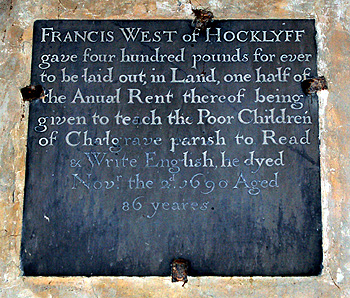Early Education in Chalgrave

Francis West charity plaque in the south aisle of the church June 2012
Volume 81 published by Bedfordshire Historical Records Society (2002) is a series of episcopal visitations undertaken in the first twenty years of the 18th century, edited by former County Archivist Patricia Bell. At each visitation a list of questions was sent out in advance, one of which enquired about the provision of schools in each parish. In 1706 the vicar recorded: "Mr. Francis West of Hockliffe by Will dated March 31st 1690 and proved in Doctors' Commons November 10th 1690 left £400 to purchase lands, one halfe of the rent to be given to poor Inhabitants of Chalgrave, the other part to poor Inhabitants of Hockliffe, the better to enable them to set their Children to School to Read and Write. This money is accordingly layd out, and lands purchased with it at Simpson in Bucks, and the rent duly paid by Joseph Cooper and William Grant Trustees". In 1709 the vicar wrote: "No Public or Charity Schole, besides Mr. West's endowment". In 1717 the vicar simply wrote: "No Publick or charity School" and in 1720: "No Charity school".
In 1818 a Select Committee was established to enquire into educational provision for the poor. This was no doubt prompted, in part, by the recent foundation of two societies promoting education and specifically the building of schools. The Society for Promoting the Lancasterian System for the Education of the Poor was established in 1808 promoting schools run along the lines pioneered by Joseph Lancaster, who had himself copied those of Dr. Andrew Bell, in which older children taught their younger fellows. The Society was renamed the British and Foreign School Society in 1814. It was supported by a number of prominent nonconformists, Lancaster himself was a Quaker, and sought to teach a non-sectarian curriculum. In answer to this perceived nonconformist takeover of local education the National Society was formed in 1811 to encourage the teaching of poor children along Anglican lines, including the catechism. The Select Committee sent a questionnaire to all parishes in the country asking for: particulars relating to endowments for the education of children; other educational institutions; observations of parish needs etc. In those days a Sunday School was just that, a school which met on a Sunday, usually in the church or nonconformist chapel or other similar building, teaching more than the religious topics with which they are associated today. The return for Chalgrave was done jointly with Hockliffe and noted that there was: “one small school, endowed by Francis West, with some land in the neighbourhood, producing about £30 per annum, to instruct the children of both parishes; about 16 boys attend … the present schoolmaster never attends the established church, therefore there is no regular Sunday school”. Later references make it clear that this endowed school was in the parish of Hockliffe.
In the country generally the number of schools built continued to grow over the next fifteen years so that by 1833 the government agreed to supplement the work of the two societies, and local benefactors, by making £20,000 per annum available in grants to help build schools. It also prompted another questionnaire to be sent to each parish in England asking for details of local educational provision. The return for Chalgrave was as follows: “One Daily School (commenced 1827), containing 12 males; supported by payments from the parents; and two Sunday Schools. One (commenced 1833) in which about 10 males and 10 females receive gratuitous instruction, and attend the Established Church; the other (commenced 1818) consisting of 64 males and 55 females; supported by subscription, and appertaining to Wesleyan Methodists. Children of Thomas parish are eligible to the endowed school at Hockliffe”.
The next national enquiry was in 1846/7 when the Church of England made an enquiry as to all its church schools. This was against the background of a new Whig government which championed secular education and the increasing importance of nonconformists, particularly Wesleyan Methodist, and Roman Catholics in providing schools. The return for Chalgrave was included in that for Hockliffe which noted a Sunday School with 62 boys and 52 girls and a daily school with 60 boys and 58 girls. The return opined: “It would be very desirable to have a master’s house attached to the National school. And a room at Tebworth, in the parish of Chalgrave, for a Day and Sunday school is also needed”. So it is clear that there was no Church school yet in the parish of Chalgrave. Chalgrave National School opened in 1852, the Wesleyan day school having opened in 1838